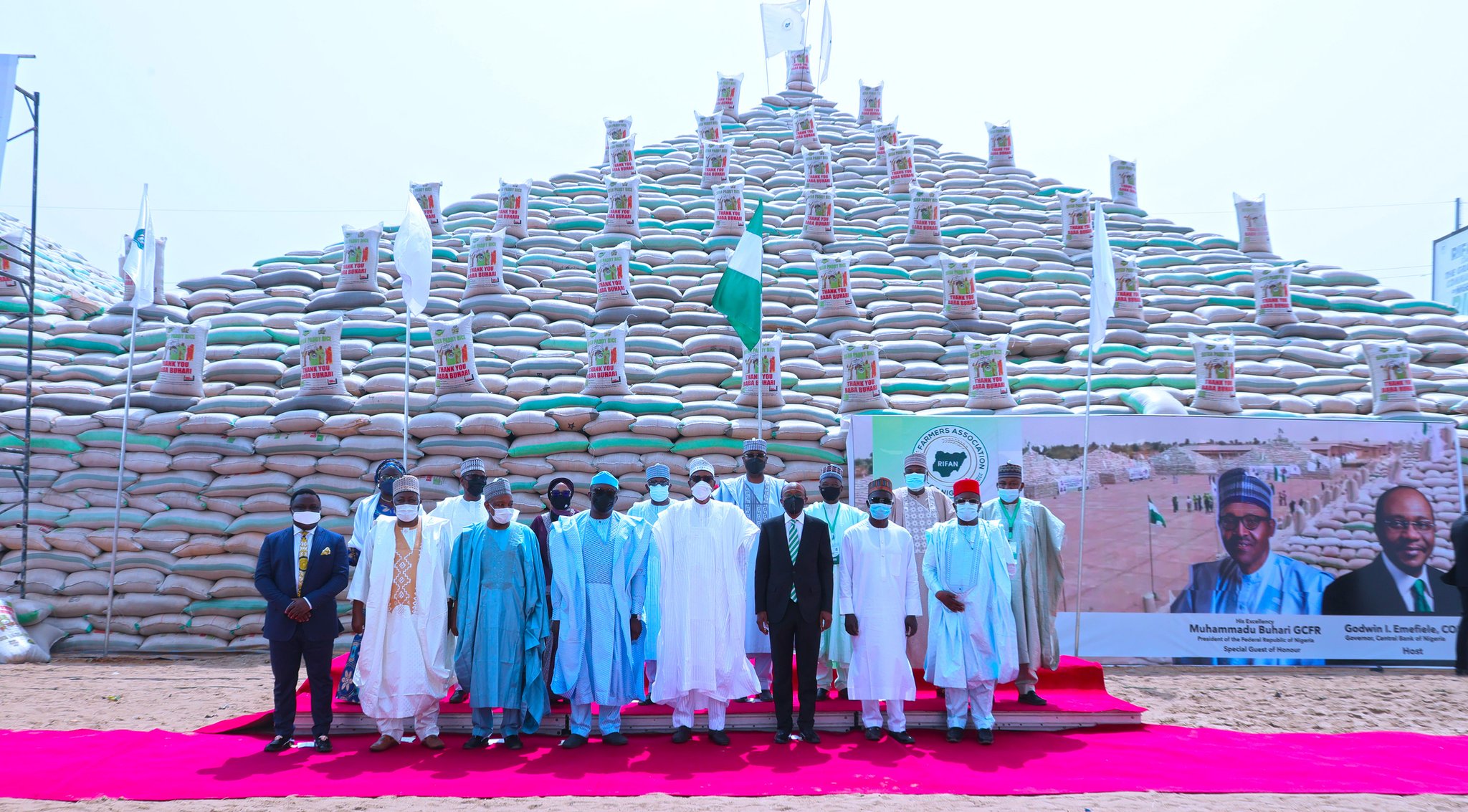President Muhammadu Buhari, Thursday, commissioned a large-scale integrated rice mill in Sheda, Kwali Area Council, Abuja, of the Federal Capital Territory, FCT, to boost local consumption and export.

Buhari who was represented by the Minister of Agriculture and Rural Development, Dr Mohammed Abubakar, said other nine large-scale integrated rice mills are soon to be completed and commissioned across the country.
The large-scale integrated rice mill commissioned in Sheda was Federal Government’s partnership with Ocean Glory Commodities Limited, and the mill has a production capacity of four tonnes per hour.
He said: Commissioning the Large Scale Integrated Rice Mill, located here in Sheda, Kwali, FCT, as one of the 10 mills embarked upon by my Administration for the purpose of expanding domestic rice production and achieving self-sufficiency in the country.
“For the past eight years, this regime has intensively promoted and supported Agricultural development in the country through the Anchor Borrower Programme, the Fertilizer Initiative, Grain Aggregation Centres and Special Agro-industrial Processing Zone Programme.
“This is line with the Food Security’s component of this Government’s nine priorities. Indeed, as such, our agricultural development strategy has enabled the increased output recorded in critical arable and cash crops.
“This accomplishment clearly demonstrates our commitment to addressing critical infrastructural projects and keeping with the ideals of the ‘Change Agenda’ to ensure prudence in the management of public resources, value for money considering the huge investments in this project.
“We have witnessed the rapid increase in domestic rice production from the incentive given to farmers and processors over this period as a resolution of leveraging our potentials, producing what we consume and patronising locally made products.”
He also maintained that Nigeria has the capacity and resources to remain food secure based on the comparative advantage she possesses, “In the agricultural sector, we indeed have the capacity to be food secure if we rightly harness and deploy our human and material resources.
“An aspect of this commitment is the establishment of ten Large Scale Integrated Rice Processing Mills located across the North West, North East, North Central, South-South and South West Zones of the country.
“The concept is a Public Private Partnership between the government and the anchor investors to increase the country’s processing capacity for rice production and fill-up the demand-supply gap and make the country self-sufficient in the commodity value chain.”
Meanwhile, according to the President, the country’s paddy yield per hectare has significantly increased to the extent of being adequate in the raw material production to keep production of the commodity going seamlessly and added that it is a result of the determination of backward integration and economic diversification within the ambit of comparative advantage of natural resource utilization.
“In this regard, we believe that all the institutional capacitation in place, in the areas of infrastructure, research, credit, insurance, quarantine, mechanization and input would be sustained by successive administrations to consistently make the country food secure.
Therefore, he urged investors to always take advantage of the PPP arrangement in order to establish more integrated medium and large-scale processing rice mills to reduce post-harvest losses, widen the derivate products of agricultural commodities and reduce food importation.
However, the President charged stakeholders of the Mills, especially, the management to “ensure efficient operations, good customer service and maintenance culture in the operations of the mill.”
Meanwhile, the Minister of Agriculture and Rural Development, Dr Mohammed Abubakar, on the sidelines of the event asserted that Buhari is the champion of Nigeria’s agriculture, and said his predecessors could not diversify the economy as promised but Buhari has achieved that.
“President Muhammadu Buhari is the champion of Agriculture in Nigeria. Over the years presidents have come and gone who said they would diversify the economy of Nigeria from the mono-economy that is dependent on oil to an economy that is dependent on other sectors.
“The only person that talked and walked his talk is His Excellency, President Muhammadu Buhari. Today Nigeria is boosting of Agriculture being the number one country’s Gross Domestic Product, GDP, year after year.
“Even last year, agricultural sector contributed 23 per cent to the GDP, and the second sector coming with only 17 per cent. So that mission of diversification has been achieved”, Abubakar said.
He also added that Nigeria has no business importing rice from Thailand and other countries based on the capacity of the rice value chain, which Nigeria currently is the biggest producer of rice in Africa and number four in the world, hence there is no food shortage in Nigeria.
“What I have seen there (the rice mill), the machinery there are world class and the final product. Why should we go and import rice from Thailand when we have this? Don’t. This is exactly the same you can see in other parts of the world, and this is what the President did to make sure we conserve our foreign exchange.
“We have the land, people and brains to produce the rice we are importing year after year spending millions of Naira and foreign exchange, and today we conserve all of that and we are doing that in Nigeria because is cheaper and even better. The capacity of the mill is four tonnes per hour.”